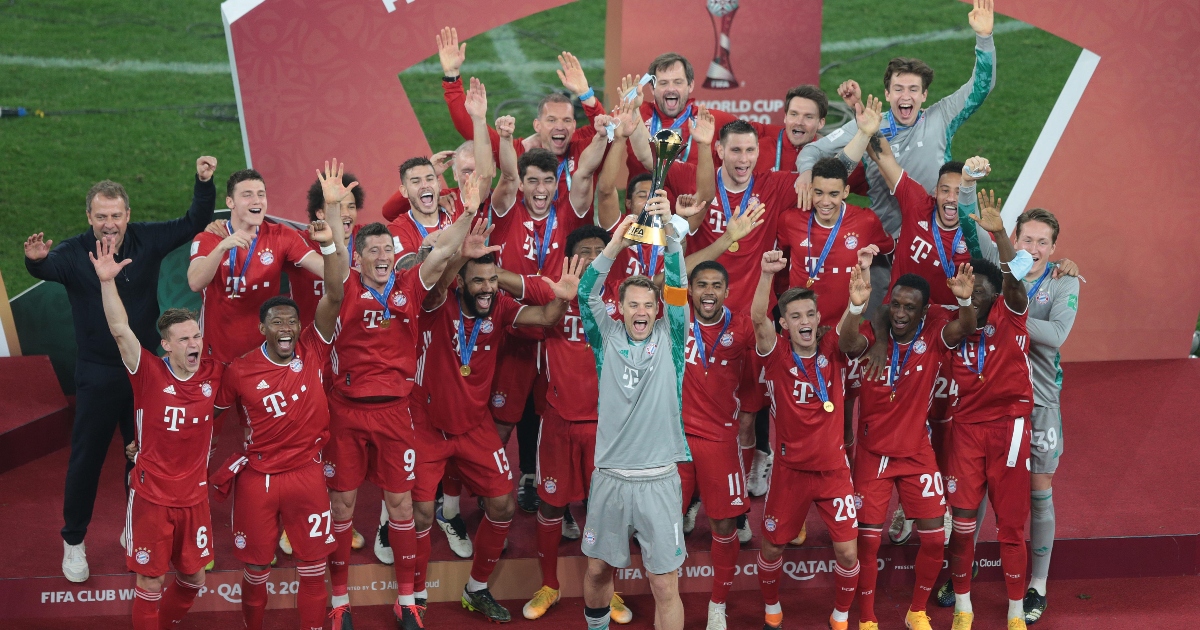

Following the implementation of stringent health and safety protocols, Qatar completed the successful hosting of the 17th edition of the FIFA Club World Cup™ on Thursday night. The tournament culminated with victory for German side FC Bayern München, who defeated Mexican club Tigres UANL at Education City Stadium.
The UEFA Champions League winners claimed the trophy for the second time thanks to a 1-0 victory over the CONCACAF Champions League holders, who were appearing in their first final. Frenchman Benjamin Pavard scored the only goal of the game in the 59th minute. Earlier in the day, Al Ahly SC won the third-place play-off after beating SE Palmeiras on penalties after the match finished goalless after 90 minutes. A limited number of fans attended the third-place play-off and final double-header, in line with Qatar’s Ministry of Public Health guidelines to prevent the spread of COVID-19.
Two FIFA World Cup stadiums were utilised during the tournament: the recently inaugurated Ahmad Bin Ali and Education City. Both hosted matches with limited capacities to comply with health and safety protocols. Everyone who attended the venues was mandated to provide a negative COVID-19 test, show evidence of contracting the virus or have been vaccinated.
During the tournament, competing teams formed medical bubbles, while all visitors were tested for COVID-19 on arrival in the country. Fans and officials who attended tournament venues were also required to take COVID-19 tests, while all facilities were deep-cleaned on a regular basis. Anyone who tested positive for COVID-19 was immediately isolated in line with Qatar’s national guidelines.
H.E. Hassan Al Thawadi, Secretary General of the Supreme Committee for Delivery & Legacy and Qatar 2022 Chairman, said: “Delivering an event of this magnitude during the challenging times we’re all experiencing is an effort that relies on the continuous resilience and resourcefulness of all our national stakeholders.
“I’m extremely proud of the work undertaken by our Local Organising Committee, in close collaboration with the relevant national authorities, to deliver a safe and successful FIFA Club World Cup for fans, players and officials.
“The feedback from FIFA and the participating clubs on our venues, facilities, hospitality and organising capabilities has been overwhelmingly positive and serves to inspire us as we continue our journey towards hosting the world in 2022.”
Nasser Al Khater, FIFA Club World Cup Qatar 2020 Local Organising Committee CEO and Qatar 2022 CEO, said: “It has been a privilege to host the FIFA Club World Cup for the second time. Despite the pandemic, we have been able to build on the successful hosting of the 2019 edition and continue to develop our plans and procedures for the FIFA Arab Cup later this year and of course the World Cup in 2022. Events such as these shine a light on every area of our operations and play a vital role in preparing our country for the biggest tournament of all in under two years’ time.”
Al Khater said Qatar will now begin focusing on the FIFA Arab Cup – an international tournament which will take place from 1-18 December, exactly a year before the World Cup.
“In recent months Qatar has done everything it can to support the continuation of top-level club football, including hosting the AFC Champions League, Amir Cup final and FIFA Club World Cup. Our next challenge will be the FIFA Arab Cup, which will see the top 16 Arab nations go head-to-head in Qatar. It promises to be a memorable event – and one which will test every part of our infrastructure and preparations for 2022.”

